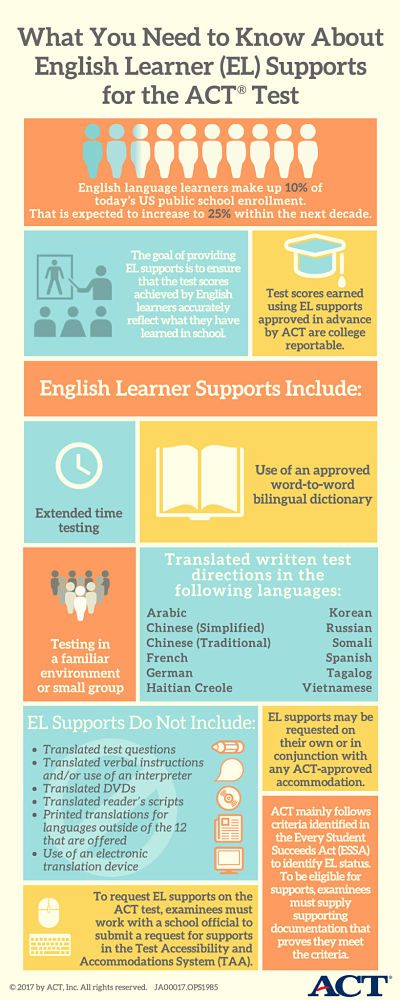
As announced late last year, starting this fall ACT will be providing additional support for students taking the ACT who are English learners.
Why is this important you may ask? As a former English learner myself, I understand that learning a new language is already hard; you might master proficiency of English at 80 percent for example, but when you take the ACT test you may come across a word that’s not familiar. In addition to getting the answer correct, and the urgency of a timed test, struggling with the words is an added challenge and stressor. Giving students who are English learners a word-to-word bilingual dictionary (no definitions) only helps their outcomes.
From an equal education opportunity standpoint, this new EL supports help to level the playing field for students who are English learners, ensuring they are able to demonstrate what they have learned in school, without receiving any special advantages.
According to the Pew Research Center, “The U.S. has more immigrants than any other country in the world. Today, more than 40 million people living in the U.S. were born in another country, accounting for about one-fifth of the world’s migrants in 2015. The population of immigrants is also very diverse, with just about every country in the world represented among U.S. immigrants.”
What’s more, immigrants come from around the world. Also according to Pew, “Mexico is the top origin country of the U.S. immigrant population. In 2015, 11.6 million immigrants living in the U.S. were from there, accounting for 27% of all U.S. immigrants. The next largest origin groups were those from China (6%), India (6%), the Philippines (5%) and El Salvador (3%).” With this in mind, ACT has taken the lead in providing supports for students whose first language isn’t English. Directions will be provided in the following languages: Arabic; Chinese (Traditional); Chinese (Simplified); French; German; Haitian Creole; Korean; Russian, Somali; Spanish, Tagalog; and Vietnamese.
ACT’s support of English learners is a step in the right direction to ensure equity, opportunity, and access to students from all backgrounds. I’m proud to be not only an evolving former English learner myself, but ACT team member. Some of my fellow ACT colleagues who were also English learners weighed in:
“The ACT Test has always been about providing students the opportunity to demonstrate their academic knowledge and skills. For those of us who did not grow up with English as a native language (and who often think of ourselves as “not good test takers”), the new supports for English learners remove a hurdle to demonstrating our knowledge and skills and coming closer to showing our true potential with postsecondary institutions.” – Alex Casillas, Ph.D., Principal Research Psychologist
“Grateful to ACT’s mission to support English learners. It’s creating a window of opportunity for all learners to achieve educational success no matter your first language.” – Will Ortega, Recruiter
“As an immigrant and former English language learner, I feel and know that the ACT English Language Learners support policy provides level ground for English language learners to demonstrate their knowledge, skills and achievements. Research has shown the effectiveness for providing these support in testing English language learners. It is a way for ACT and for us working at ACT to achieve the mission of helping English language learners achieve success in academic and workplace.” – Changhua Rich, Ph.D., Principal Research Scientist
We will continue to work with schools, families, our partners and community organizations to ensure supports are in place to help. I am very proud and excited to be part of an organization that cares about removing barriers for ALL students while advancing our mission of: helping people achieve education and workplace success!

